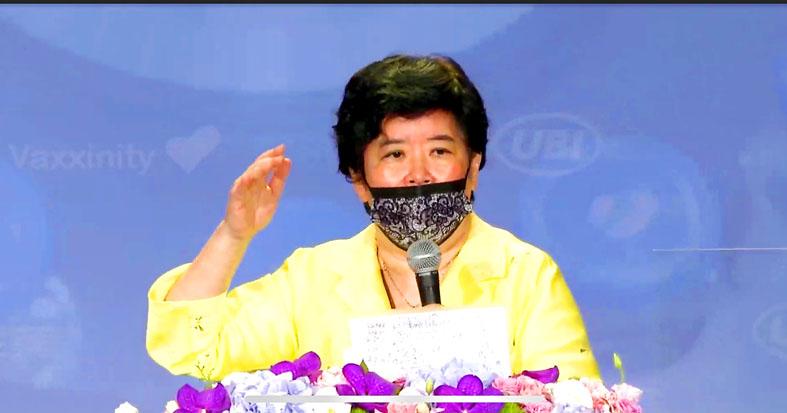United Biomedical Inc Asia (UBI, 聯亞生技) yesterday said that it would again apply for emergency use authorization (EUA) for its COVID-19 experimental vaccine after its first application was rejected last week.
The company would organize data and statistics generated from its ongoing phase 2 clinical trial that indicate its experimental vaccine’s effect on fighting the Delta variant of SARS-CoV-2, and it would again apply to the Food and Drug Administration (FDA) for an EUA, a company statement said.
That marked a turn in the company’s position concerning its failed application.

Photo: Screen grab from United Biomedical Inc virtual news conference
United Biomedical chairwoman Wang Chang-yi (王長怡) on Sunday slammed the FDA, saying the agency’s standards were “bold and outdated,” and that the company would appeal the FDA’s decision soon.
Shares of UBI Pharma Inc (聯亞藥), a United Biomedical subsidiary, yesterday rallied 3.94 percent to NT$132 in Taipei trading. The shares had gained 12 percent since Monday last week, when United Biomedical’s application was rejected. However, that was less than half of its peak price of NT$290 on June 24, Taipei Exchange data showed.
United Biomedical yesterday apologized for Wang’s comment on Sunday, saying that she was too emotional as she was anxious amid concern over the possible effect of the Delta variant, which has rapidly spread in other countries.
The company said it was sorry if Wang’s comments had upset regulators, including the FDA and the Center for Drug Evaluation, the statement said. The company said it appreciated their assistance during its development of the vaccine since June last year.
The company reiterated that even though its experimental vaccine, dubbed UB-621, failed to meet the FDA’s standards on neutralizing antibodies, UB-621 is still comparable to other COVID-19 vaccines in terms of fighting the Delta variant.
United Biomedical believes that its experimental vaccine could be an effective tool in curbing the Delta variant, it said.
The company has produced seven batches of antigens of 2,000ml, which would be enough for the company to make 60 million doses of the UB-621 vaccine, company data showed.
Shares of Medigen Vaccine Biologics Corp (高端疫苗), another local developer of a COVID-19 vaccine, yesterday gained 1.22 percent to close at NT$289.50, Taipei Exchange data showed.
The stock is sharply down from NT$337 on Monday after five people died since inoculations with the Medigen vaccine began.

Taiwanese suppliers to Taiwan Semiconductor Manufacturing Co. (TSMC, 台積電) are expected to follow the contract chipmaker’s step to invest in the US, but their relocation may be seven to eight years away, Minister of Economic Affairs J.W. Kuo (郭智輝) said yesterday. When asked by opposition Chinese Nationalist Party (KMT) Legislator Niu Hsu-ting (牛煦庭) in the legislature about growing concerns that TSMC’s huge investments in the US will prompt its suppliers to follow suit, Kuo said based on the chipmaker’s current limited production volume, it is unlikely to lead its supply chain to go there for now. “Unless TSMC completes its planned six

Intel Corp has named Tasha Chuang (莊蓓瑜) to lead Intel Taiwan in a bid to reinforce relations between the company and its Taiwanese partners. The appointment of Chuang as general manager for Intel Taiwan takes effect on Thursday, the firm said in a statement yesterday. Chuang is to lead her team in Taiwan to pursue product development and sales growth in an effort to reinforce the company’s ties with its partners and clients, Intel said. Chuang was previously in charge of managing Intel’s ties with leading Taiwanese PC brand Asustek Computer Inc (華碩), which included helping Asustek strengthen its global businesses, the company

Power supply and electronic components maker Delta Electronics Inc (台達電) yesterday said second-quarter revenue is expected to surpass the first quarter, which rose 30 percent year-on-year to NT$118.92 billion (US$3.71 billion). Revenue this quarter is likely to grow, as US clients have front-loaded orders ahead of US President Donald Trump’s planned tariffs on Taiwanese goods, Delta chairman Ping Cheng (鄭平) said at an earnings conference in Taipei, referring to the 90-day pause in tariff implementation Trump announced on April 9. While situations in the third and fourth quarters remain unclear, “We will not halt our long-term deployments and do not plan to

The New Taiwan dollar and Taiwanese stocks surged on signs that trade tensions between the world’s top two economies might start easing and as US tech earnings boosted the outlook of the nation’s semiconductor exports. The NT dollar strengthened as much as 3.8 percent versus the US dollar to 30.815, the biggest intraday gain since January 2011, closing at NT$31.064. The benchmark TAIEX jumped 2.73 percent to outperform the region’s equity gauges. Outlook for global trade improved after China said it is assessing possible trade talks with the US, providing a boost for the nation’s currency and shares. As the NT dollar